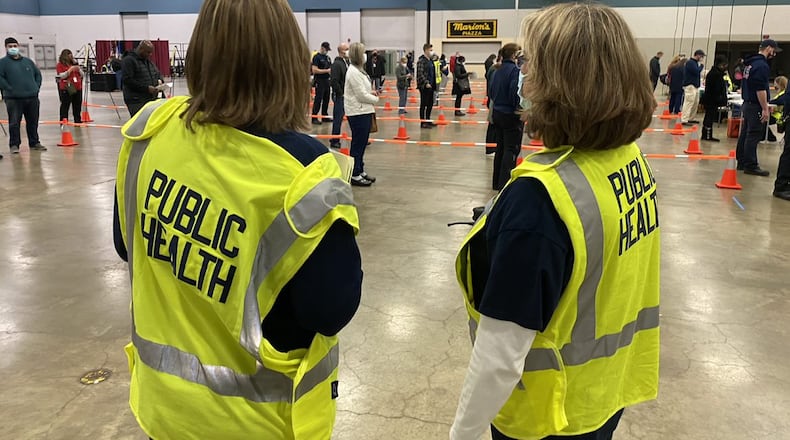“My read is, you’re talking probably Christmastime, or at least Thanksgiving, before something is decided because of the legal challenges,” Karl said.
The manufacturers’ association has offered a weekly COVID update for its members since March 2020.
“We’re letting them know this is weeks away — at least weeks away,” Karl said.
Robert Robenalt — a Columbus-based partner with the Fisher Phillips law firm who has advised the OMA — said, “We’re still a little ways out from this taking effect.”
Here are the basics: OSHA is expected to release what’s called an “ETS” — an emergency temporary standard outlining what is expected of employers. Biden has already said that employers with more than 100 workers will be expected to ensure their workers are vaccinated or undergo at least weekly COVID-19 testing.
No one knows when that emergency standard will take effect. But the manufacturers’ association said on its website last week that the standard could be “weeks away.”
A message with questions was sent to the Department of Labor last week. OSHA is part of that department.
The ETS could take several weeks to complete, and once released, may remain in place for six months. After that, a permanent OSHA standard, with a formal rulemaking process involving a typical notice-and-comment period, is expected, the manufacturers’ association said, citing guidance from the Fisher Phillips law firm.
“We don’t have anything to react to other than what the president has outlined in his speech three weeks ago,” Karl said.
It may be mid-October or the end of October until the new federal standard is published in the Federal Register, Robenalt said in an interview.
The ETS will likely offer a “grace period” for companies to get into compliance, he said.
“You’re looking at the beginning of the December before anything takes effect and that assumes ... nothing gets stayed by court action,” Robenalt said.
It’s uncertain how the court process will play out, but historically courts have not always been welcoming of emergency temporary standards, he added.
Additionally, some have raised questions about whether OSHA has sufficient personnel to enforce a mandate that impacts an estimated 80 million workers.
“The agency is traditionally running in a position where they run fairly lean throughout the country,” Robenalt said. “There are budget issues and staffing issues they are faced with, but I would think the Biden administration wants this to be a priority.”
He added that no employer should risk being in violation of the mandate in the expectation that OSHA might be understaffed in any state or region.
“The employer at their own peril will violate any of these standards,” Robenalt warned.
The vaccination/testing emergency standard will apply to all private employers with more than 100 employees, estimated to impact some 80 million workers nationwide, Fisher Phillips has said in a outline on its web site. Covered employers who ignore the standard could face OSHA citations and penalties of up to $14,000 per violation.
Karl has heard a range of reactions to the mandate from his association’s 1,500 manufacturer members.
“It just depends the type of manufacturer,” he said.
For example, a company in the food and beverage manufacturing space whose employees cannot socially distance as much as they might like might welcome a vaccine mandate, he said. Another business that has taken plenty of precautions and hasn’t seen COVID cases among employees might feel otherwise.
The Ohio Manufacturers’ Association position is simple: “We believe that employers should have the right to determine their own policies for the workplace,” Karl said. “That’s regardless of government level, whether it’s federal, state or local.”
However, he added, the association has supported vaccines from the outset.
Guidance released by the federal government Sept. 24 said federal contractors must ensure that all covered contractor employees are fully vaccinated no later than Dec. 8.
Steve Staub, of Staub Manufacturing Solutions in Harrison Twp., opposes the mandate. While he has fewer than 100 employees, he said he has been contacted “by people looking for employment that are leaving larger companies that will be requiring a vaccine mandate.”
“Long story short, I see the mandate as really hurting larger companies, and in the long run, the economy will suffer,” Staub said.
Jim Bowman, president and chief executive of Dayton’s Noble Tool, also has fewer than 100 workers. He says he “highly recommends” that his workers become vaccinated, but he also strives to respect their personal stance on the subject. He said his workers are physically distanced and equipment is routinely cleaned.
“When you create a challenging work environment, then it becomes more inefficient and it becomes more hostile, and it certainly adds to the challenges we have in manufacturing,” he said.
Bowman’s concern is that the mandate will cause new disruptions in supply chains and already tight labor pools for bigger companies, including customers and partners in defense and aerospace.
“Those big whiplash effects are very difficult and challenging to manage,” Bowman said.
About the Author

